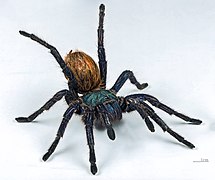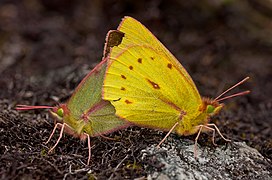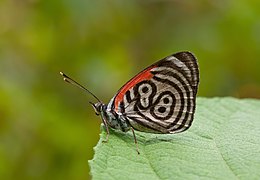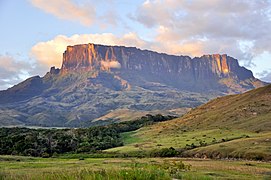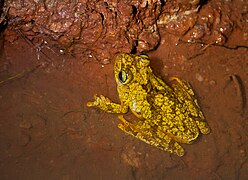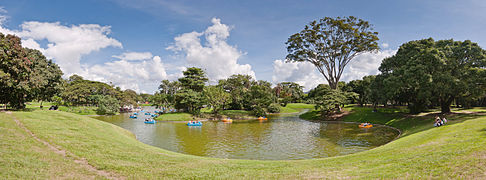
Back بوابة:فنزويلا Arabic Portal:Venezuela German Portal:Venezuela Spanish Portail:Venezuela French Portale:Venezuela Italian Portal:Venezuela Malay Portal:Venezuela Portuguese Портал:Венесуэла Russian
The Venezuela Portal Venezuela, officially the Bolivarian Republic of Venezuela, is a country on the northern coast of South America, consisting of a continental landmass and many islands and islets in the Caribbean Sea. Venezuela comprises an area of 916,445 km2 (353,841 sq mi), and its population was estimated at 29 million in 2022. The capital and largest urban agglomeration is the city of Caracas. The continental territory is bordered on the north by the Caribbean Sea and the Atlantic Ocean, on the west by Colombia, Brazil on the south, Trinidad and Tobago to the north-east and on the east by Guyana. Venezuela is a presidential republic consisting of 23 states, the Capital District and federal dependencies covering Venezuela's offshore islands. Venezuela is among the most urbanized countries in Latin America; the vast majority of Venezuelans live in the cities of the north and in the capital. The territory of Venezuela was colonized by Spain in 1522 amid resistance from Indigenous peoples. In 1811, it became one of the first Spanish-American territories to declare independence from the Spanish and to form part of the first federal Republic of Colombia (Gran Colombia). It separated as a full sovereign country in 1830. During the 19th century, Venezuela suffered political turmoil and autocracy, remaining dominated by regional military dictators until the mid-20th century. Since 1958, the country has had a series of democratic governments, as an exception where most of the region was ruled by military dictatorships, and the period was characterized by economic prosperity. The 2024 presidential election was held on 28 July 2024 to choose a president for a six-year term beginning on 10 January 2025. Polls conducted before the election indicated that opposition candidate González would win by a wide margin. After the government-controlled National Electoral Council (CNE) announced partial results showing a narrow Maduro victory, most world leaders expressed skepticism of the claimed results and did not recognize the CNE claims. Both González and Maduro proclaimed themselves winners of the election. The results of the election were not recognized by the Carter Center and Organization of American States due to the lack of granular results, and disputed by the opposition, which claimed a landslide victory and released access to vote tallies collected by poll watchers from a majority of polling centers as proof. In the aftermath of the announcement of results by the election authorities, protests broke out across the country. (Full article...) Selected article -Fortín Solano is an eighteenth-century colonial fortification overlooking Puerto Cabello, Venezuela. With the Castillo San Felipe, an earlier fort built at sea level, it formed part of a complex of fortifications designed to protect Puerto Cabello and its important harbour from naval attacks. It was constructed c. 1766 by order of Don José Solano y Bote on behalf of the King of Spain. It has been described as the last military construction built in Venezuela during the colonial era. The fort has been the center of several notable events in Venezuelan history. Spanish commander Antonio Zuazola was hanged after a surprise attack by the forces of Rafael Urdaneta overthrew the royalists, giving control of the fort to the patriots. Pedro Carujo was imprisoned in the fort after attempting to kill Simón Bolívar in 1828. In 1962, the fort was the stronghold of an uprising led by several commanders in the city. (Full article...)Selected picture
The Bolivarian Games are a regional multi-sport event held in honor of Simón Bolívar, and organized by the Bolivarian Sports Organization. The event is open to athletes from Bolivia, Chile, Colombia, Ecuador, Panama, Peru, and Venezuela.
Selected biography -General Gregor MacGregor (24 December 1786 – 4 December 1845) was a Scottish soldier, adventurer, and confidence trickster who attempted from 1821 to 1837 to draw British and French investors and settlers to "Poyais", a fictional Central American territory that he claimed to rule as "Cazique". Hundreds invested their savings in supposed Poyaisian government bonds and land certificates, while about 250 emigrated to MacGregor's invented country in 1822–23 to find only an untouched jungle; more than half of them died. Seen as a contributory factor to the "Panic of 1825", MacGregor's Poyais scheme has been called one of the most brazen confidence tricks in history. From the Clan Gregor, MacGregor was an officer in the British Army from 1803 to 1810; he served in the Peninsular War. He joined the republican side in the Venezuelan War of Independence in 1812, quickly became a general and, over the next four years, operated against the Spanish on behalf of both Venezuela and its neighbour New Granada. His successes included a difficult month-long fighting retreat through northern Venezuela in 1816. He captured Amelia Island in 1817 under a mandate from revolutionary agents to conquer Florida from the Spanish, and there proclaimed a short-lived "Republic of the Floridas". He then oversaw two calamitous operations in New Granada during 1819 that each ended with his abandoning British volunteer troops under his command. (Full article...)In this month...
Did you know (auto-generated) -
Selected list -The University City of Caracas is a World Heritage Site in Caracas, Venezuela. It is a functional university campus for the Central University of Venezuela, as well as home to 108 notable works of art and famous examples of creative architecture. Many works of art are modernist and mosaic. The campus was designed by architect Carlos Raúl Villanueva, who oversaw much of the construction and design work, with the artwork overseen by Mateo Manaure. Villanueva primarily enlisted artists who were either European or had European influences – Villanueva himself had been inspired for the campus design in Paris – including members of Los Disidentes, a group of Venezuelan artists who left for Europe to break from the Mexican mural tradition. Some artists did not initially want to work on the project, as they were opposed to the military dictatorship in place in Venezuela at the time, but French artist Fernand Léger encouraged them to participate by saying that "dictatorships pass but art remains"; part of Villanueva's intention was unity. Latin American art scholar Monica Amor wrote that Villanueva's Synthesis of the Arts philosophy, inspired by an André Bloc approach, "advocated a strong humanist approach to urban issues of reconstruction and social healing after the devastation of World War II." Amor noted that debate surrounding the dictatorship's funding of the project, and its realization in this context, persists into the 21st century. (Full article...)Current events
More did you know...
TopicsCategoriesRecognized content
Featured articlesGood articles
Featured pictures
New articlesThis list was generated from these rules. Questions and feedback are always welcome! The search is being run daily with the most recent ~14 days of results. Note: Some articles may not be relevant to this project.
Rules | Match log | Results page (for watching) | Last updated: 2024-08-10 22:07 (UTC) Note: The list display can now be customized by each user. See List display personalization for details.
Things you can doWikiProjects
Related portalsAssociated WikimediaThe following Wikimedia Foundation sister projects provide more on this subject:
Discover Wikipedia using portals |
© MMXXIII Rich X Search. We shall prevail. All rights reserved. Rich X Search




